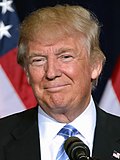
Each of the 50 U.S. states, the District of Columbia, and territories of the United States holds either primary elections or caucuses to help nominate individual candidates for president of the United States. This process is designed to choose the candidates that will represent their political parties in the general election.

Super Tuesday is the United States presidential primary election day in February or March when the greatest number of U.S. states hold primary elections and caucuses. Approximately one-third of all delegates to the presidential nominating conventions can be won on Super Tuesday, more than on any other day. The results on Super Tuesday are therefore a strong indicator of the likely eventual presidential nominee of each political party.
In American politics, a superdelegate is a delegate to a presidential nominating convention who is seated automatically.

Republican Party of American Samoa is the affiliate of the U.S. Republican Party in American Samoa. It is based in the territorial capital of Pago Pago.
The 2012 American Samoa Republican presidential caucuses was held on March 13, 2012. 70 registered Republicans selected six delegates in a closed-door meeting to represent the territory in the 2012 Republican National Convention. On March 14, 2012, Dr. Victor T. Tofaeono, the chair for the Republican Party of American Samoa, announced that all six delegates, along with three at-large delegates, had pledged their support to Mitt Romney.

Presidential primaries and caucuses of the Republican Party took place within all 50 U.S. states, the District of Columbia, and five U.S. territories between February 1 and June 7, 2016. These elections selected the 2,472 delegates that were sent to the Republican National Convention. Businessman and reality television personality Donald Trump won the Republican nomination for president of the United States.

The 2016 United States elections were held on Tuesday, November 8, 2016. Republican nominee Donald Trump defeated Democratic former Secretary of State Hillary Clinton in the presidential election, while Republicans retained control of Congress. This marked the first and most recent time Republicans won or held unified control of the presidency and Congress since 2004.
The following is a timeline of major events leading up to, during, and after the 2016 United States presidential election. The election was the 58th quadrennial United States presidential election, held on November 8, 2016. The presidential primaries and caucuses were held between February 1 and June 14, 2016, staggered among the 50 states, Washington, D.C., and U.S. territories. The U.S. Congress certified the electoral result on January 6, 2017, and the new president and vice president were inaugurated on January 20, 2017.

This article contains the results of the 2016 Republican presidential primaries and caucuses, the processes by which the Republican Party selected delegates to attend the 2016 Republican National Convention from July 18–21. The series of primaries, caucuses, and state conventions culminated in the national convention, where the delegates cast their votes to formally select a candidate. A simple majority (1,237) of the total delegate votes (2,472) was required to become the party's nominee and was achieved by the nominee, businessman Donald Trump of New York.
The 2016 Guam Republican presidential caucuses took place on March 12 in the U.S. territory of Guam as one of the Republican Party's primaries ahead of the 2016 presidential election.
The 2016 U.S. Virgin Islands Republican presidential caucuses took place on March 10 in the U.S. territory of the United States Virgin Islands as one of the Republican Party's primaries ahead of the 2016 presidential election.

The 2016 Missouri Republican presidential primary took place March 15 in the U.S. state of Missouri, as a part of the Republican Party's series of presidential primaries ahead of the 2016 United States presidential election. The Missouri primary was held alongside Republican primary elections in Florida, Illinois, North Carolina and Ohio, along with the Democratic contest in Missouri. The hotly contested primary was won by businessman Donald Trump by a margin of 0.21% over Texas Senator Ted Cruz.

The 2016 Colorado Republican presidential caucuses took place in early April in the U.S. state of Colorado, as a part of the Republican Party's series of presidential primaries ahead of the 2016 presidential election. The Colorado contest consisted of a series of congressional district conventions on April 2, 7 and 8 and a state convention on April 9. A non-binding "beauty contest" caucus was held March 1 to coincide with the Super Tuesday conventions. Ted Cruz won a majority of delegates in the convention.

Presidential primaries and caucuses of the Republican Party took place in many U.S. states, the District of Columbia, and five U.S. territories from February 3 to August 11, 2020, to elect most of the 2,550 delegates to send to the Republican National Convention. Delegates to the national convention in other states were elected by the respective state party organizations. The delegates to the national convention voted on the first ballot to select Donald Trump as the Republican Party's nominee for president of the United States in the 2020 election, and selected Mike Pence as the vice-presidential nominee.

Although American Samoa did not participate in the 2020 presidential election because it is a U.S. territory and not a state, it still participated in the U.S. presidential primaries and caucuses. Former mayor Michael Bloomberg won the Democratic caucus, held on March 3. The Republican caucus, in the form of a territorial convention held on March 18, endorsed incumbent President Donald Trump.

Although the Northern Mariana Islands did not participate in the 2020 presidential election because it is a U.S. territory and not a state, it still participated in the U.S. presidential primaries and caucuses. Senator Bernie Sanders won the Democratic caucus, held on March 14, which would be his last win in the 2020 primary season. The Republican caucus, held on March 15 during the party's commonwealth convention, unanimously voted for incumbent President Donald Trump.

Although the United States Virgin Islands did not participate in the 2020 presidential election because it is a U.S. territory and not a state, it still participated in the U.S. presidential caucuses and primaries. Former vice president Joe Biden won the Democratic caucuses, held on June 6. The Republican caucuses, held on March 14 in the form of a territorial convention, voted for incumbent president Donald Trump.

The 2020 Iowa Republican presidential caucuses took place on Monday, February 3, 2020, as the first caucus or primary in the Republican Party presidential primaries for the 2020 presidential election. The Iowa caucuses are a closed caucus, with Iowa awarding 40 pledged delegates to the Republican National Convention, allocated on the basis of the results of the caucuses. Incumbent president Donald Trump received about 97 percent of the vote to clinch 39 delegates, while Bill Weld received enough votes to clinch 1 delegate.

Although Guam did not participate in the 2020 presidential election because it is a U.S. territory and not a state, it still participated in the U.S. presidential primaries and caucuses. Former vice president Joe Biden won the Democratic caucus, held on June 6. The Republican caucus, held on March 14 in the form of a "state convention", endorsed incumbent President Donald Trump.

Although American Samoa will not participate in the 2024 presidential election because it is a U.S. territory and not a state, it participated in the U.S. presidential primaries and caucuses for both the Democratic and Republican parties.














